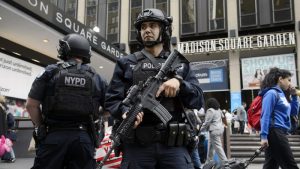
A NYPD Counterterrorism Bureau heavy weapons team is posted in front of Madison Square Garden as people attending a graduation exit the Manhattan arena on Tuesday, May 23, 2017. Photo by Charles Eckert
In the hours after a bomb killed 22 people outside an Ariana Grande concert at England’s Manchester Arena, representatives for 26 of the world’s biggest venues held a conference call with security officials about how to prevent another attack. “To this point, security has been about crowd management, but now there has to be terrorism [prevention] built into the concert,” says Bill Bratton, the former New York police commissioner who is the executive chairman of Prevent Advisors, which consults dozens of arenas, including Madison Square Garden and the L.A. Forum.
On a recent afternoon in L.A., 300 concert-industry veterans attended a conference where Bratton and his team showed off and discussed the newest technologies – from invisible walls that keep foreign objects out to facial-recognition software – that concert venues are using to battle terrorism. Here are some of the latest inventions that aim to be the future of crowd safety.
1. Vapor-Sniffing Dogs
Bon Jovi are just one band that requests “Vapor Wake” dogs at concerts. While normal police dogs are trained to screen concertgoers one by one, Vapor Wake dogs can screen hundreds of people at a time. They are trained to recognize the microscopic “thermal plumes” emitted by a person carrying an explosive. The dogs, mostly Labradors, are bred in labs at Auburn University, trained for 15 months and often socialized in prisons. “You could track the guy into a [specific] seat in a stadium from the vapor wake trailing in the air,” says Mike Downing, Prevent’s executive VP of security.
2. Anti-Drone Technology
In May, a GoPro drone crashed into the upper deck of San Diego’s Petco Park during a Padres game. It belonged to a novice drone pilot, but the incident spooked experts, who see a weaponized drone attack as a real possibility. Some venues have been using a piece of equipment devised by Dan Magy, a tech developer, who studied the signals between drones and controllers and devised an algorithm that builds a “virtual wall” around a venue that keeps drones out. At the conference, Magy showed off a suitcase-size box, explaining how it scrambles drone signals. “You cre ate a barrier,” Magy says. “We essentially send the signal back at the drone that will confuse it.”
3. Sophisticated Cameras
A new 360-degree camera can automatically detect body language associated with suspicious activity, such as looting and “zone intrusion,” before it notifies staff. This comes in handy at arenas, which are equipped with anywhere from 300 to 2,000 security cameras – so many that they can be tough to monitor. “The people in the operations room have a hard time learning what’s relevant,” says Thomas McIntyre of Axis Communications, which manufactures the technology.
4. Smartphone Body Cameras
At a U2 concert in June at Levi’s Stadium in Santa Clara, California, 40 officers wore smartphones containing a live-video app that can zoom in on suspects. “If there was an active shooter, [the operations room] could turn on all the live streams at once,” says Alexander Popof, chief operating officer of a Silicon Valley firm that manufactures the technology. After a show, police can use that app’s “heat map” to determine which parts of a venue need more security.
5. Face-Mapping
It’s still a few years off, but facial-recognition technology will eventually be commonplace at major public events. These cameras can cross-reference a person’s image with millions of photographs – from FBI databases and background checks – to instantly determine whether someone is a security risk. Soon enough, similar technology will be able to recognize a person simply by the way he or she walks.
6. Social-Media Monitoring
The Grammys and the Super Bowl are among other big events that use software like Babel Street, which scours 25 social media sites in 200 languages for suspicious online activity. Venue security sets a “geowall” around the event, and it scans everything from Facebook check-ins to tweets. “There was chatter on Twitter prior to the Manchester attack,” says Downing. “Had there been a geo-fence established, it could have provided information pre-attack.
7. Advanced Metal Detectors
Security officials have told venues to ramp up metal detectors post-Manchester, but “long lines are a risk,” says Chris Robinette, president of Prevent. This is why venues like Dodger Stadium have started using “magnetometers,” which can screen fans quickly without having them remove everything from their pockets. Says Robinette, “You can move through 80,000 people much more efficiently.”
By Steve Knopper
http://www.rollingstone.com/music/news/concert-securitys-new-frontier-w494570
[Thank you to Alex Teitz, http://www.femmusic.com, for contributing this article.]

